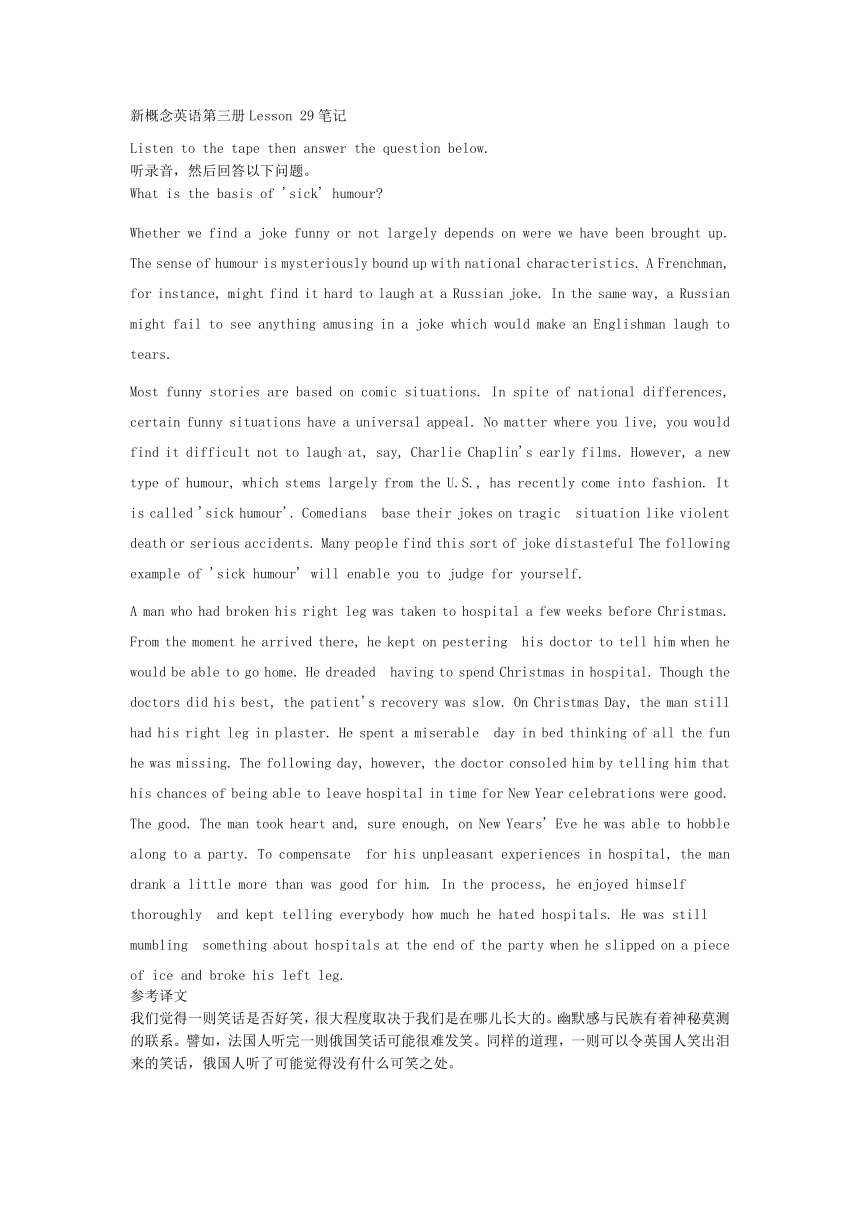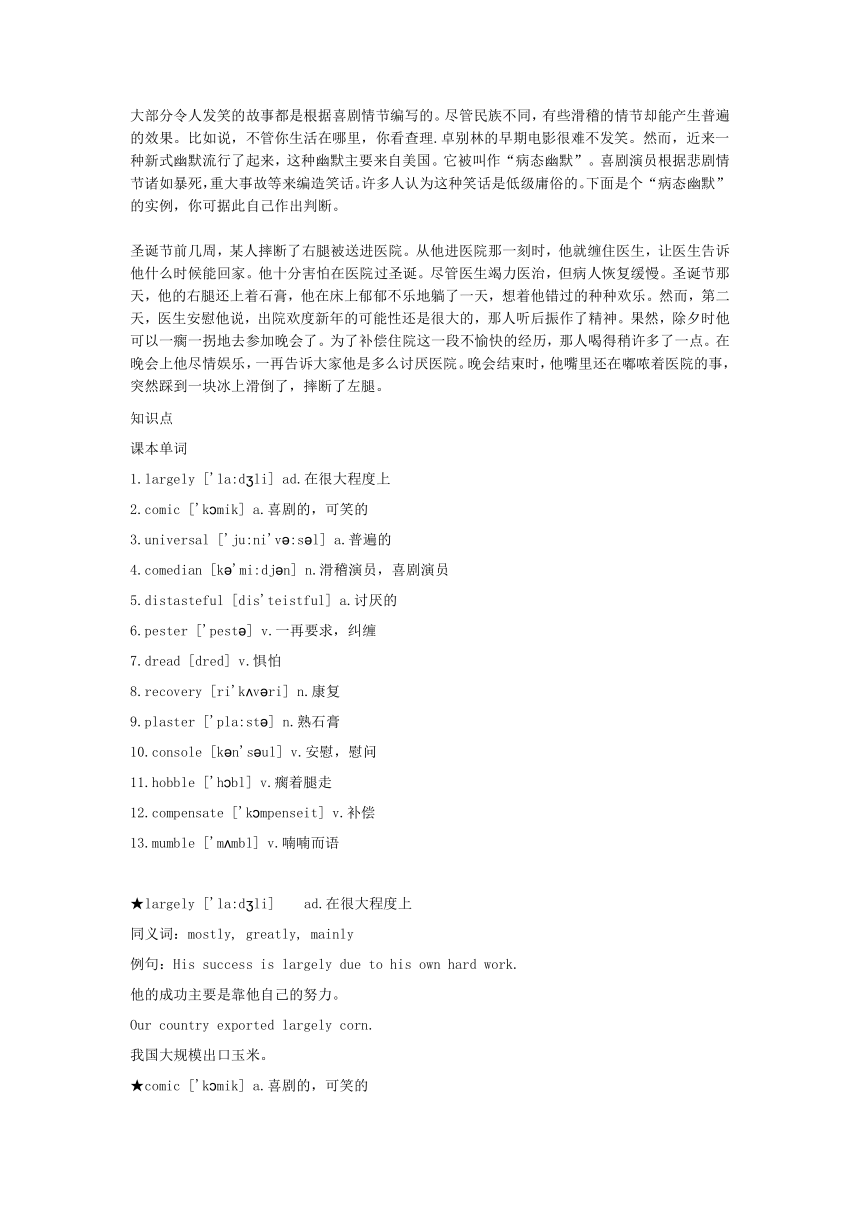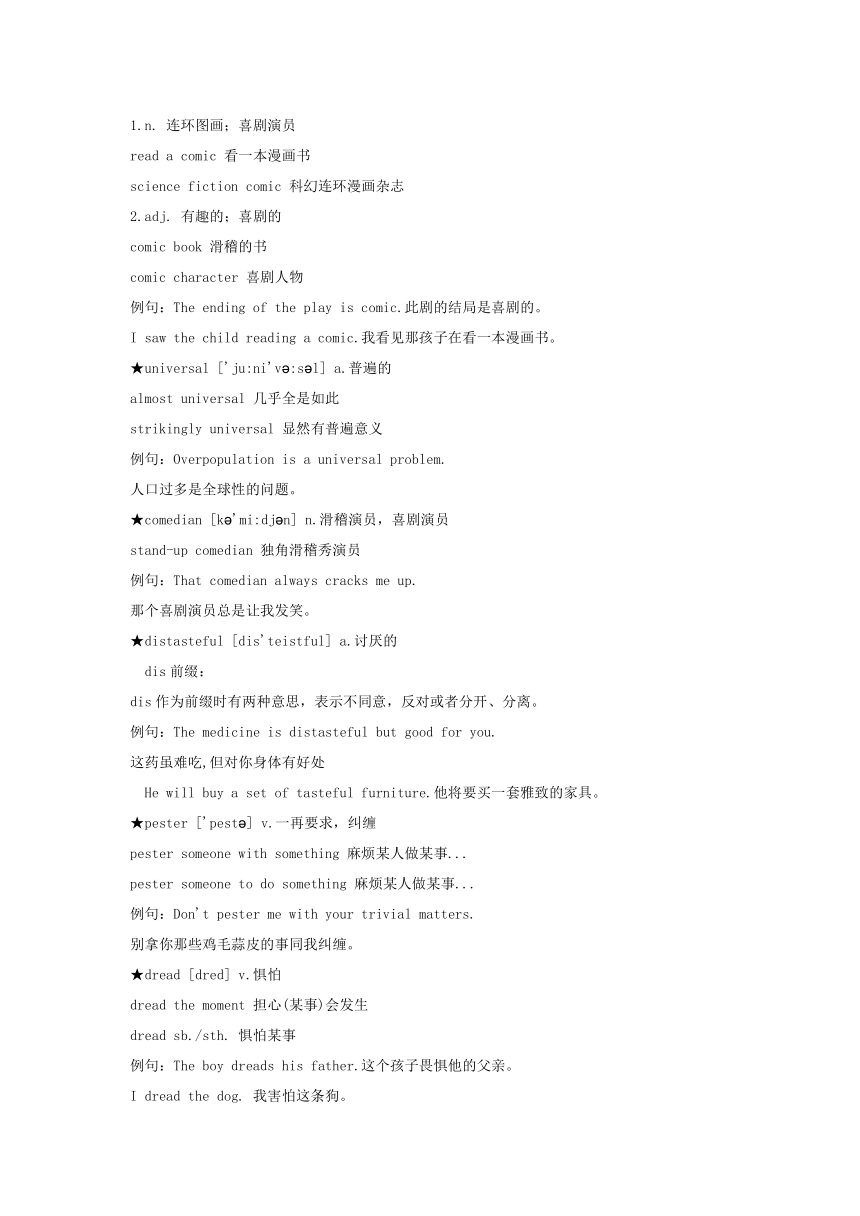新概念英语第三册Lesson 29 Funny or not?笔记
文档属性
| 名称 | 新概念英语第三册Lesson 29 Funny or not?笔记 |  | |
| 格式 | docx | ||
| 文件大小 | 21.4KB | ||
| 资源类型 | 教案 | ||
| 版本资源 | 新概念英语 | ||
| 科目 | 英语 | ||
| 更新时间 | 2023-09-17 14:26:14 | ||
图片预览



文档简介
新概念英语第三册Lesson 29笔记
Listen to the tape then answer the question below.
听录音,然后回答以下问题。
What is the basis of 'sick' humour
Whether we find a joke funny or not largely depends on were we have been brought up. The sense of humour is mysteriously bound up with national characteristics. A Frenchman, for instance, might find it hard to laugh at a Russian joke. In the same way, a Russian might fail to see anything amusing in a joke which would make an Englishman laugh to tears.
Most funny stories are based on comic situations. In spite of national differences, certain funny situations have a universal appeal. No matter where you live, you would find it difficult not to laugh at, say, Charlie Chaplin's early films. However, a new type of humour, which stems largely from the U.S., has recently come into fashion. It is called 'sick edians base their jokes on tragic situation like violent death or serious accidents. Many people find this sort of joke distasteful The following example of 'sick humour' will enable you to judge for yourself.
A man who had broken his right leg was taken to hospital a few weeks before Christmas. From the moment he arrived there, he kept on pestering his doctor to tell him when he would be able to go home. He dreaded having to spend Christmas in hospital. Though the doctors did his best, the patient's recovery was slow. On Christmas Day, the man still had his right leg in plaster. He spent a miserable day in bed thinking of all the fun he was missing. The following day, however, the doctor consoled him by telling him that his chances of being able to leave hospital in time for New Year celebrations were good. The good. The man took heart and, sure enough, on New Years' Eve he was able to hobble along to a party. To compensate for his unpleasant experiences in hospital, the man drank a little more than was good for him. In the process, he enjoyed himself thoroughly and kept telling everybody how much he hated hospitals. He was still mumbling something about hospitals at the end of the party when he slipped on a piece of ice and broke his left leg.
参考译文
我们觉得一则笑话是否好笑,很大程度取决于我们是在哪儿长大的。幽默感与民族有着神秘莫测的联系。譬如,法国人听完一则俄国笑话可能很难发笑。同样的道理,一则可以令英国人笑出泪来的笑话,俄国人听了可能觉得没有什么可笑之处。
大部分令人发笑的故事都是根据喜剧情节编写的。尽管民族不同,有些滑稽的情节却能产生普遍的效果。比如说,不管你生活在哪里,你看查理.卓别林的早期电影很难不发笑。然而,近来一种新式幽默流行了起来,这种幽默主要来自美国。它被叫作“病态幽默”。喜剧演员根据悲剧情节诸如暴死,重大事故等来编造笑话。许多人认为这种笑话是低级庸俗的。下面是个“病态幽默”的实例,你可据此自己作出判断。
圣诞节前几周,某人摔断了右腿被送进医院。从他进医院那一刻时,他就缠住医生,让医生告诉他什么时候能回家。他十分害怕在医院过圣诞。尽管医生竭力医治,但病人恢复缓慢。圣诞节那天,他的右腿还上着石膏,他在床上郁郁不乐地躺了一天,想着他错过的种种欢乐。然而,第二天,医生安慰他说,出院欢度新年的可能性还是很大的,那人听后振作了精神。果然,除夕时他可以一瘸一拐地去参加晚会了。为了补偿住院这一段不愉快的经历,那人喝得稍许多了一点。在晚会上他尽情娱乐,一再告诉大家他是多么讨厌医院。晚会结束时,他嘴里还在嘟哝着医院的事,突然踩到一块冰上滑倒了,摔断了左腿。
知识点
课本单词
1.largely ['la:d li] ad.在很大程度上
2.comic ['k mik] a.喜剧的,可笑的
3.universal ['ju:ni'v :s l] a.普遍的
4.comedian [k 'mi:dj n] n.滑稽演员,喜剧演员
5.distasteful [dis'teistful] a.讨厌的
6.pester ['pest ] v.一再要求,纠缠
7.dread [dred] v.惧怕
8.recovery [ri'k v ri] n.康复
9.plaster ['pla:st ] n.熟石膏
10.console [k n's ul] v.安慰,慰问
11.hobble ['h bl] v.瘸着腿走
12.compensate ['k mpenseit] v.补偿
13.mumble ['m mbl] v.喃喃而语
★largely ['la:d li] ad.在很大程度上
同义词:mostly, greatly, mainly
例句:His success is largely due to his own hard work.
他的成功主要是靠他自己的努力。
Our country exported largely corn.
我国大规模出口玉米。
★comic ['k mik] a.喜剧的,可笑的
1.n. 连环图画;喜剧演员
read a comic 看一本漫画书
science fiction comic 科幻连环漫画杂志
2.adj. 有趣的;喜剧的
comic book 滑稽的书
comic character 喜剧人物
例句:The ending of the play is comic.此剧的结局是喜剧的。
I saw the child reading a comic.我看见那孩子在看一本漫画书。
★universal ['ju:ni'v :s l] a.普遍的
almost universal 几乎全是如此
strikingly universal 显然有普遍意义
例句:Overpopulation is a universal problem.
人口过多是全球性的问题。
★comedian [k 'mi:dj n] n.滑稽演员,喜剧演员
stand-up comedian 独角滑稽秀演员
例句:That comedian always cracks me up.
那个喜剧演员总是让我发笑。
★distasteful [dis'teistful] a.讨厌的
dis前缀:
dis作为前缀时有两种意思,表示不同意,反对或者分开、分离。
例句:The medicine is distasteful but good for you.
这药虽难吃,但对你身体有好处
He will buy a set of tasteful furniture.他将要买一套雅致的家具。
★pester ['pest ] v.一再要求,纠缠
pester someone with something 麻烦某人做某事...
pester someone to do something 麻烦某人做某事...
例句:Don't pester me with your trivial matters.
别拿你那些鸡毛蒜皮的事同我纠缠。
★dread [dred] v.惧怕
dread the moment 担心(某事)会发生
dread sb./sth. 惧怕某事
例句:The boy dreads his father.这个孩子畏惧他的父亲。
I dread the dog. 我害怕这条狗。
Tom dreaded his visits to the dentist.汤姆非常怕看牙医。
★recovery [ri'k v ri] n.康复
economic recovery 经济复苏
recovery from 从…中恢复过来
recovery of the stolen goods 赃物的追回
例句:The owner has offered a reward for the recovery of the stolen goods.
失主已经悬赏寻找被窃物品。
Will the government's policies lead to an economic recovery
政府的政策能使经济复苏吗
★plaster ['pla:st ] n.熟石膏
plaster cast 石膏模型
plaster figure 石膏像
He mixed up some plaster to repair the wall.他和了一些灰泥去补墙。
He's got his leg in a plaster cast.他的腿打了石膏。
★console [k n's ul] v.安慰,慰问
console sb a great deal 给某人很大的安慰
console perfunctorily 敷衍了事地安慰
We tried to console her when her dog died.
她的狗死后,我们尽力安慰她。
They perfunctorily consoled him with a few words.
他们敷衍了事地安慰了他几句。
★hobble ['h bl] v.瘸着腿走
The old man hobbled along (the road) with the aid of his stick.
那老汉拄著拐杖一瘸一拐地走著。
I hurt my foot,and had to hobble home.
我的脚受了伤,只好一拐一拐地走回家。
★compensate ['k mpenseit] v.补偿】
1.compensate for sth
Nothing can compensate for losing my husband.我失去丈夫的损失是无法弥补的。
Nothing can compensate for the loss of one's health.失去健康是无法补偿的。
2.compensate sb for sth/v-ing
The company compensated her for the extra work.公司对她所干的额外工作予以补偿。
3.compensate sth with sth
He compensated his homely appearance with great personal charm.
他的个人魅力美化了他那其貌不扬的外表。
I compensated his loss with money.我赔偿他的经济损失。
★mumble ['m mbl] v.喃喃而语
mumble away 不停地嘀咕
例句:She mumbled an apology and left.
她嘟嘟囔囔地道了歉就走了。
1.The‘taxi’is a small Swiss aeroplane called a‘Pilatus Porter’.
这辆“出租汽车”是一架小型瑞士飞机,叫“皮勒特斯·波特”号。
(1)taxi加引号是因为它不是一辆真正的出租汽车而是飞机。
(2)Swiss aeroplane是指瑞士生产的飞机。
(3) called a‘Pilatus Porter’是个过去分词短语,作aeroplane的定语,在意思上和一个定语从句差不多,即which is called a‘Pilatus Porter’。
一般说来,过去分词短语作定语时要放在所修饰的名词/代词之后,而一个单独的分词作定语时则往往放在所修饰的名词/代词前面:
It can land on a ploughed field.
它可以在耕过的田里降落。
He landed in a deserted car park.
他降落在了一个废弃的停车场上。
过去分词ploughed和deserted都位于它们所修饰的名词之前。
2.The most surprising thing about it, however, is that it can land anywhere: on snow, water, or even on a ploughed field. 然而,最令人惊奇的是它能够在任何地方降落:雪地上,水面上,甚至刚耕过的田里。
(1)表示转折的连词however可以位于句首、句末或句中,其意义不变。大多数情况下它位于句中,前后用逗号隔开。
(2)从句 that it can land anywhere在句子中起表语作用,是表语从句,that为引导词,it代指this wonderful plane。
(3) on snow, water, or even on a ploughed field是 anywhere的同位语,举例说明这架飞机可以在哪些地方降落。
3.…Captain Fawcett has flown passengers to many unusual places.……弗西特机长已经载送乘客到过许多不寻常的地方。
我们已经学过fly作为不及物动词的用法,其意义为“飞”、“飞行”:
The aeroplane is flying over the river.
飞机正从河上飞过。
在本课中,fly为及物动词,意思为“空运(乘客)”:
He has flown his car to France.
他已将他的汽车空运到法国。
Listen to the tape then answer the question below.
听录音,然后回答以下问题。
What is the basis of 'sick' humour
Whether we find a joke funny or not largely depends on were we have been brought up. The sense of humour is mysteriously bound up with national characteristics. A Frenchman, for instance, might find it hard to laugh at a Russian joke. In the same way, a Russian might fail to see anything amusing in a joke which would make an Englishman laugh to tears.
Most funny stories are based on comic situations. In spite of national differences, certain funny situations have a universal appeal. No matter where you live, you would find it difficult not to laugh at, say, Charlie Chaplin's early films. However, a new type of humour, which stems largely from the U.S., has recently come into fashion. It is called 'sick edians base their jokes on tragic situation like violent death or serious accidents. Many people find this sort of joke distasteful The following example of 'sick humour' will enable you to judge for yourself.
A man who had broken his right leg was taken to hospital a few weeks before Christmas. From the moment he arrived there, he kept on pestering his doctor to tell him when he would be able to go home. He dreaded having to spend Christmas in hospital. Though the doctors did his best, the patient's recovery was slow. On Christmas Day, the man still had his right leg in plaster. He spent a miserable day in bed thinking of all the fun he was missing. The following day, however, the doctor consoled him by telling him that his chances of being able to leave hospital in time for New Year celebrations were good. The good. The man took heart and, sure enough, on New Years' Eve he was able to hobble along to a party. To compensate for his unpleasant experiences in hospital, the man drank a little more than was good for him. In the process, he enjoyed himself thoroughly and kept telling everybody how much he hated hospitals. He was still mumbling something about hospitals at the end of the party when he slipped on a piece of ice and broke his left leg.
参考译文
我们觉得一则笑话是否好笑,很大程度取决于我们是在哪儿长大的。幽默感与民族有着神秘莫测的联系。譬如,法国人听完一则俄国笑话可能很难发笑。同样的道理,一则可以令英国人笑出泪来的笑话,俄国人听了可能觉得没有什么可笑之处。
大部分令人发笑的故事都是根据喜剧情节编写的。尽管民族不同,有些滑稽的情节却能产生普遍的效果。比如说,不管你生活在哪里,你看查理.卓别林的早期电影很难不发笑。然而,近来一种新式幽默流行了起来,这种幽默主要来自美国。它被叫作“病态幽默”。喜剧演员根据悲剧情节诸如暴死,重大事故等来编造笑话。许多人认为这种笑话是低级庸俗的。下面是个“病态幽默”的实例,你可据此自己作出判断。
圣诞节前几周,某人摔断了右腿被送进医院。从他进医院那一刻时,他就缠住医生,让医生告诉他什么时候能回家。他十分害怕在医院过圣诞。尽管医生竭力医治,但病人恢复缓慢。圣诞节那天,他的右腿还上着石膏,他在床上郁郁不乐地躺了一天,想着他错过的种种欢乐。然而,第二天,医生安慰他说,出院欢度新年的可能性还是很大的,那人听后振作了精神。果然,除夕时他可以一瘸一拐地去参加晚会了。为了补偿住院这一段不愉快的经历,那人喝得稍许多了一点。在晚会上他尽情娱乐,一再告诉大家他是多么讨厌医院。晚会结束时,他嘴里还在嘟哝着医院的事,突然踩到一块冰上滑倒了,摔断了左腿。
知识点
课本单词
1.largely ['la:d li] ad.在很大程度上
2.comic ['k mik] a.喜剧的,可笑的
3.universal ['ju:ni'v :s l] a.普遍的
4.comedian [k 'mi:dj n] n.滑稽演员,喜剧演员
5.distasteful [dis'teistful] a.讨厌的
6.pester ['pest ] v.一再要求,纠缠
7.dread [dred] v.惧怕
8.recovery [ri'k v ri] n.康复
9.plaster ['pla:st ] n.熟石膏
10.console [k n's ul] v.安慰,慰问
11.hobble ['h bl] v.瘸着腿走
12.compensate ['k mpenseit] v.补偿
13.mumble ['m mbl] v.喃喃而语
★largely ['la:d li] ad.在很大程度上
同义词:mostly, greatly, mainly
例句:His success is largely due to his own hard work.
他的成功主要是靠他自己的努力。
Our country exported largely corn.
我国大规模出口玉米。
★comic ['k mik] a.喜剧的,可笑的
1.n. 连环图画;喜剧演员
read a comic 看一本漫画书
science fiction comic 科幻连环漫画杂志
2.adj. 有趣的;喜剧的
comic book 滑稽的书
comic character 喜剧人物
例句:The ending of the play is comic.此剧的结局是喜剧的。
I saw the child reading a comic.我看见那孩子在看一本漫画书。
★universal ['ju:ni'v :s l] a.普遍的
almost universal 几乎全是如此
strikingly universal 显然有普遍意义
例句:Overpopulation is a universal problem.
人口过多是全球性的问题。
★comedian [k 'mi:dj n] n.滑稽演员,喜剧演员
stand-up comedian 独角滑稽秀演员
例句:That comedian always cracks me up.
那个喜剧演员总是让我发笑。
★distasteful [dis'teistful] a.讨厌的
dis前缀:
dis作为前缀时有两种意思,表示不同意,反对或者分开、分离。
例句:The medicine is distasteful but good for you.
这药虽难吃,但对你身体有好处
He will buy a set of tasteful furniture.他将要买一套雅致的家具。
★pester ['pest ] v.一再要求,纠缠
pester someone with something 麻烦某人做某事...
pester someone to do something 麻烦某人做某事...
例句:Don't pester me with your trivial matters.
别拿你那些鸡毛蒜皮的事同我纠缠。
★dread [dred] v.惧怕
dread the moment 担心(某事)会发生
dread sb./sth. 惧怕某事
例句:The boy dreads his father.这个孩子畏惧他的父亲。
I dread the dog. 我害怕这条狗。
Tom dreaded his visits to the dentist.汤姆非常怕看牙医。
★recovery [ri'k v ri] n.康复
economic recovery 经济复苏
recovery from 从…中恢复过来
recovery of the stolen goods 赃物的追回
例句:The owner has offered a reward for the recovery of the stolen goods.
失主已经悬赏寻找被窃物品。
Will the government's policies lead to an economic recovery
政府的政策能使经济复苏吗
★plaster ['pla:st ] n.熟石膏
plaster cast 石膏模型
plaster figure 石膏像
He mixed up some plaster to repair the wall.他和了一些灰泥去补墙。
He's got his leg in a plaster cast.他的腿打了石膏。
★console [k n's ul] v.安慰,慰问
console sb a great deal 给某人很大的安慰
console perfunctorily 敷衍了事地安慰
We tried to console her when her dog died.
她的狗死后,我们尽力安慰她。
They perfunctorily consoled him with a few words.
他们敷衍了事地安慰了他几句。
★hobble ['h bl] v.瘸着腿走
The old man hobbled along (the road) with the aid of his stick.
那老汉拄著拐杖一瘸一拐地走著。
I hurt my foot,and had to hobble home.
我的脚受了伤,只好一拐一拐地走回家。
★compensate ['k mpenseit] v.补偿】
1.compensate for sth
Nothing can compensate for losing my husband.我失去丈夫的损失是无法弥补的。
Nothing can compensate for the loss of one's health.失去健康是无法补偿的。
2.compensate sb for sth/v-ing
The company compensated her for the extra work.公司对她所干的额外工作予以补偿。
3.compensate sth with sth
He compensated his homely appearance with great personal charm.
他的个人魅力美化了他那其貌不扬的外表。
I compensated his loss with money.我赔偿他的经济损失。
★mumble ['m mbl] v.喃喃而语
mumble away 不停地嘀咕
例句:She mumbled an apology and left.
她嘟嘟囔囔地道了歉就走了。
1.The‘taxi’is a small Swiss aeroplane called a‘Pilatus Porter’.
这辆“出租汽车”是一架小型瑞士飞机,叫“皮勒特斯·波特”号。
(1)taxi加引号是因为它不是一辆真正的出租汽车而是飞机。
(2)Swiss aeroplane是指瑞士生产的飞机。
(3) called a‘Pilatus Porter’是个过去分词短语,作aeroplane的定语,在意思上和一个定语从句差不多,即which is called a‘Pilatus Porter’。
一般说来,过去分词短语作定语时要放在所修饰的名词/代词之后,而一个单独的分词作定语时则往往放在所修饰的名词/代词前面:
It can land on a ploughed field.
它可以在耕过的田里降落。
He landed in a deserted car park.
他降落在了一个废弃的停车场上。
过去分词ploughed和deserted都位于它们所修饰的名词之前。
2.The most surprising thing about it, however, is that it can land anywhere: on snow, water, or even on a ploughed field. 然而,最令人惊奇的是它能够在任何地方降落:雪地上,水面上,甚至刚耕过的田里。
(1)表示转折的连词however可以位于句首、句末或句中,其意义不变。大多数情况下它位于句中,前后用逗号隔开。
(2)从句 that it can land anywhere在句子中起表语作用,是表语从句,that为引导词,it代指this wonderful plane。
(3) on snow, water, or even on a ploughed field是 anywhere的同位语,举例说明这架飞机可以在哪些地方降落。
3.…Captain Fawcett has flown passengers to many unusual places.……弗西特机长已经载送乘客到过许多不寻常的地方。
我们已经学过fly作为不及物动词的用法,其意义为“飞”、“飞行”:
The aeroplane is flying over the river.
飞机正从河上飞过。
在本课中,fly为及物动词,意思为“空运(乘客)”:
He has flown his car to France.
他已将他的汽车空运到法国。
同课章节目录
